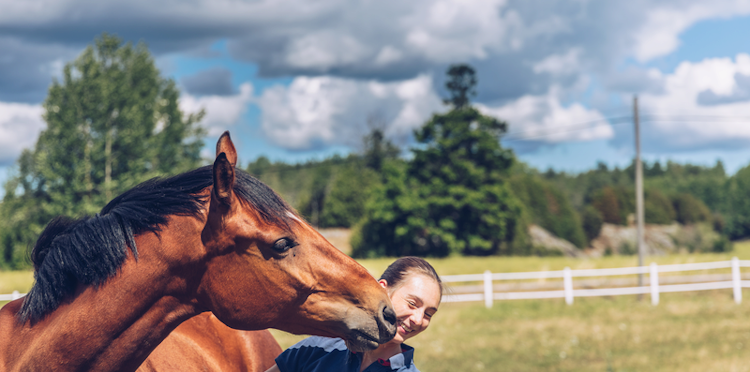How to keep your horse cool in hot weather

When it comes to caring for horses in very hot weather, common sense should rule the day. As riders and horse owners, we must understand that sometimes plans and routines have to change in order to keep our equine friends happy because a horse overheating can be much more than it simply feeling under the weather.
“Never underestimate the significance of a horse or pony overheating,” says equine vet Lucinda Ticehurst. “Prevention is always better than having to react to your horse becoming unwell. Signs of heat stress to look out for include lethargy, an increased respiratory rate and a reduced appetite, but can progress to symptoms such as muscle spasm, dark-coloured and decreased urination and dark mucous membranes.”
Just like us, some horses feel the heat more than others and are at greater risk from heat-related health problems: the very young and old; overweight equines; heavier breeds and those with existing medical issues such as cardiac and respiratory disease and gastrointestinal disorders. A horse’s coat colour can also play a part in how well it copes with heat: greys are best placed to reflect the heat, whereas a dark bay will absorb it.
If the mercury hasn’t shot up so much that riding is impossible, do this in the early morning or evening when temperatures are not at their peak, and maybe reconsider how you exercise your horse. The surfaces of some arenas seem to eat up the heat making even gentle schooling heavy weather. A quiet hack, ideally somewhere with plenty of shade such as through woodland, is a better choice of heatwave leg stretch.
Shady woodland is the perfect spot for a hot-weather hack
Another alternative is working with your horse from the ground. This can enable the refinement of many training exercises and often uses more mental than physical energy. It also allows more heat loss from across the back: your horse can work and continue to learn without the added pressure of a saddle and rider in extreme temperatures.
After exercise, make sure to wash down your horse really well. This not only helps them cool down but makes them less attractive to irritating flies. For a time, debate did rage in the horse world about the merits of hosing down. Some argued that water in the horse’s coat simply warmed and then acted as an insulating layer but this theory has, one might say, had cold water poured on it.
“Cooling of the whole body with cold water is recommended. The hotter a horse is the more rapidly it requires help to cool,” says Lucinda Ticehurst. “Continuous application of cold water either with a hose or buckets of water is the best way of doing this.”
Hosing with cold water is a simple but effective method of cooling your horse
This is supported by the vets associated with international teams competing at the Olympics and top-class competitions across the world with horses that are not always accustomed to temperature extremes but have high athletic demands. These events run with major protocols in place to enable rapid horse cooling pre-and post-exertion, plus horses undergo stringent vet checks before commencing any intense exercise.
Lucinda believes that there are times when as riders we simply have to accept it is too hot to ride. “There is no point exerting horses when temperatures are really peaking. Instead, use your time to sponge or hose down your horse as a preventative measure.”
Make sure horses are in the coolest place possible for the hottest hours of the day: depending on the position and ventilation of stables this might be inside or turned out, providing their field has shady spot. Consider buying a fan and setting this up outside your horse’s stable if there is no letup in sizzling temperatures.
Should the temperature really shoot up, consider investing in a fan
Some horses are good drinkers and do an excellent job of keeping themselves hydrated. If your horse isn’t one such equine, add some very dilute fruit juice to a water bucket or think about adding extra water to their feed. Electrolytes encourage more fluid uptake and replace those lost through sweating, while it is always important that horses have access to a salt lick that can be used as and when required.
When it feels like a day to be sipping on a Pimm’s or splashing in a pool, the last thing anyone wishes to think about is poo picking but keeping stables and fields as clear as possible of muck is crucial on very hot days. Manure attract flies: an irritation that only adds to horses’ discomfort – and the risk of infections – on really hot days.
Heat stress can come on very suddenly, even with preventative measures. If you are at all concerned about your horse, it is essential to seek veterinary advice as a matter of urgency.


